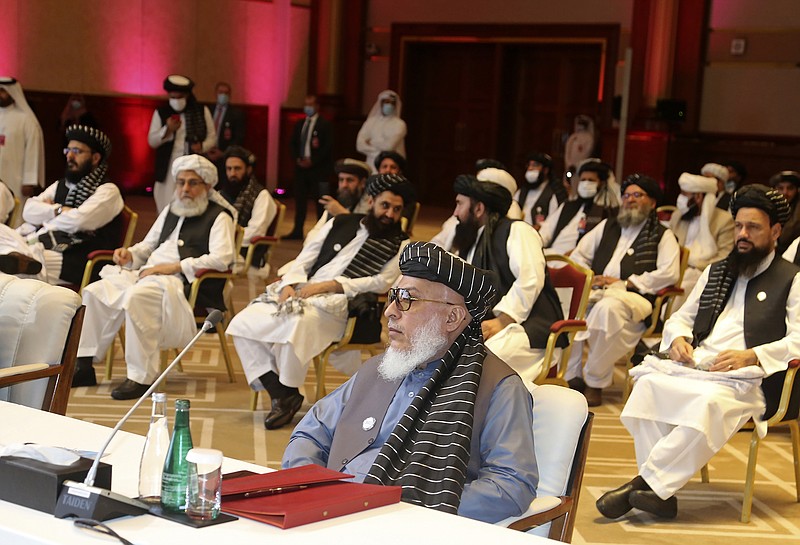ISLAMABAD -- The Afghan Taliban on Thursday welcomed a tweet from President Donald Trump in which he promised to have the last of U.S. troops out of Afghanistan by Christmas -- or at least by the end of the year.
"We should have the small remaining number of our BRAVE Men and Women serving in Afghanistan home by Christmas," Trump tweeted.
Multiple U.S. officials, speaking on condition of anonymity to discuss sensitive troop details, said they know of no plan for either new deadline. Instead, they pointed to comments Wednesday by national security adviser Robert O'Brien, who told an audience in Las Vegas that "as of today, there are under 5,000 and that will go to 2,500 by early next year."
U.S. officials said troop numbers have not yet been reduced to 4,500, but will hit that goal in November as planned. The military has also consistently said that counterterrorism troops would remain in Afghanistan for some time to deal with al-Qaida and Islamic State threats.
A senior Trump administration official said Trump, with his tweet, laid down a marker Wednesday on U.S. troop withdrawals from Afghanistan and since he is the commander in chief, the rest of the administration will follow his lead. The official also spoke on condition of anonymity because of the sensitivity of troop withdrawals.
When asked about his tweet, Trump told Fox Business Channel: "We're down to 4,000 troops in Afghanistan. I'll have them home by the end of the year. They're coming home, you know, as we speak. Nineteen years is enough. They're acting as policemen, OK? They're not acting as troops."
America's exit from Afghanistan after nearly two decades was laid out in an agreement Washington reached with the Taliban in February. However, that agreement said U.S. troops would be out of Afghanistan in 18 months, provided the Taliban honored a commitment to fight terrorist groups, with most attention seemingly focused on the Islamic State group's affiliate in the country.
Taliban spokesman Zabihullah Mujahed said Trump's statement was welcome and he considered it a positive step for the implementation of the peace agreement between the U.S. and the Taliban.
The Taliban are "committed to the contents of the agreement and hope for good and positive relations with all countries, including the U.S, in the future," he said.
Trump's surprise tweet late Wednesday came as the Taliban and the Afghan government-appointed negotiating team are holding historic peace talks in Doha, Qatar.
Those talks have been painfully slow as both sides have become bogged down on the intricacies of how they would go forward with reaching an agreement. Weeks have been spent discussing Islamic jurisprudence and how it will impact negotiations.
Still, both sides have stayed at the negotiating table even as Washington's peace envoy Zalmay Khalilzad last week returned to the region. Little information of substance has emerged from the talks.
On Thursday, Khalilzad was in Pakistan with Gen. Austin Miller, commander of U.S. forces in Afghanistan, meeting with Pakistan's Army Chief of Staff Gen. Qamar Jaaved Bajwa. Pakistan has helped shepherd the Taliban to the negotiating table and its role is seen as critical for lasting peace in Afghanistan.
There was no immediate information about the purpose of Thursday's meeting but Khalilzad has been keen to get both sides -- particularly the Taliban -- to sign on to a reduction in violence at least while the Qatar negotiations are underway and until a permanent cease-fire can be negotiated.
Even before Trump's latest pronouncement, the White House has refused to allow U.S. negotiators to base troop withdrawals on the signing of a peace deal between the Afghan government and the Taliban. Instead, American diplomats and military officials were able to say only that withdrawals would be based on conditions on the ground, meaning a measurable reduction in Taliban attacks, rather than any resolution to the country's long-running internal conflicts.
"What we need to see is that they're not going to allow al-Qaida to base there," said Gen. Frank McKenzie, head of U.S. Central Command, in a September interview with NBC News. "And that has just not yet been demonstrated to my satisfaction."
McKenzie and other military officials have also said that the drawdown must be done responsibly, and that moving faster will make it more difficult to get sensitive and critical American military equipment out of Afghanistan.
"We're not going to leave anything behind that somebody could use against us in another time and another place. So that's actually a huge logistics effort and it is continuing now," McKenzie said last month.
NATO Secretary-General Jens Stoltenberg, asked about Trump's comments Thursday, did not say whether he had been alerted to the new deadlines.
Information for this article was contributed by Lolita C. Baldor, Kathy Gannon, Matthew Lee, Lorne Cook and Deb Riechmann of The Associated Press.
